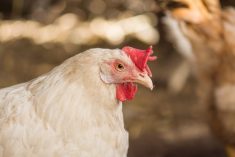By Barbara Duckworth
Calgary bureau
LOUISVILLE, Ky. — Dealing with a highly contagious disease like foot and mouth could be a logistical nightmare for a large country like the United States.
Typically the emergency plan demands a nation stop all movement within the agricultural community. With 50 states fighting over jurisdiction, a smaller zoning system may be more feasible than shutting down the entire country, said Patrick Webb, director of swine health programs for the National Pork Board.
“In the U.S. we would run into a lot of problems if we had this disease,” he said yesterdays during an animal welfare session of the National Institute of Animal Agriculture meeting in Louisville, Kentucky.
Read Also

Ample supplies and improved livestock sector to boost Canadian feed sector: FCC
Abundant feed grain supplies and improved profitability for the livestock sector should support strong feed demand and sales through the winter, says a new report from Farm Credit Canada.
Dealing with foot-and-mouth disease was discussed during a special symposium at the end of the NIAA conference.
From the animal welfare perspective, halting all traffic would make it impossible to deliver feed to farms or get animals to market. People may not want to do euthanasia or know how to provide proper care when barns became too full. This could happen within three days.
“We have to make sure that we are taking care of them and addressing welfare issues, even if we have a nasty disease causing turmoil,” he said.
Control areas would be the focus, but state veterinarians often do not have much information on how many or where farms are located within a control zone. They may not know the species or how to get in touch with producers.
A 2008 study determined about one million pigs are on the road at any given time in the U.S. If movement stopped, where would they go?
“We are going to have a lot of pigs and a lot of trailers with no home,” he said.
“I am a big fan of managed movement from an animal welfare perspective,” he said.
Food security would also be affected because pork and other meats would not make it to store shelves.
Every week the U.S. kills about 2.4 million pigs, putting about 360 million pounds of meat on the domestic market and exporting 90 million lb.

















